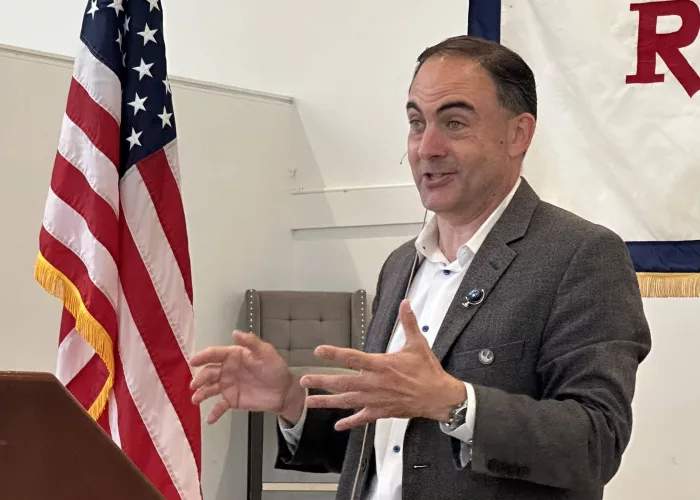
By Charlie Shapiro
At the July 2 meeting of the Retired Men’s Association Tim Brooks introduced Aaron Woodin, a computer expert and consultant at PC Ventures, LLC, in White Plains. Woodin delivered a significant talk titled “Don’t Fall for It! Recognizing and Avoiding Scams,” highlighting the rapidly evolving nature of digital deception. He underscored the pervasive impact of scams by noting the “sea of hands shooting skyward with alacrity” when audience members were asked if they had received scam calls or emails. Woodin emphasized that scammers exploit a fundamental human trait: trust. Every successful scam, he warned, erodes our ability to trust digital communications, potentially leading to a “very, very dark world” where trustworthiness is constantly in doubt. His goal is to educate the public and slow this erosion as much as possible.
Scammers employ several core common tactics. They exploit default institutional trust, leveraging our conditioning to believe communications from seemingly legitimate entities like banks, Microsoft, or government agencies such as the IRS. They also create false urgency, pressuring victims into quick actions to prevent critical thought and proper response. Emotional manipulation, often involving fear, is another key tactic. Modern scams increasingly enforce isolation, instructing victims not to confide in anyone, even family members.
Woodin detailed various common digital traps. Fake event invitations, often disguised as services like Punchbowl, can contain embedded links that install remote control programs, allowing scammers to take over a computer. Fake invoices, purportedly from antivirus companies like McAfee or Norton, often have suspicious sender email addresses (e.g., Gmail instead of the company’s domain), “word salad” text, unusual amounts, and strange phone numbers. Woodin’s critical advice: never call numbers on suspicious invoices. Instead, use legitimate customer service numbers kept on file.
Scam screens are pop-ups, often with loud voices, that warn users not to shut down their computers. Woodin’s counterintuitive advice is to always do the opposite: shutting down the computer or using Ctrl+Alt+Delete to end the browser task usually defeats these. He also warned about “Facebook or Fakebook” scams, where duplicated social media alerts lead to “living nightmare” scam screens, coercing victims into purchasing gift cards and keeping it secret. Given that banks are “increasingly unwilling to make people whole” on fraudulent transactions, Woodin advised adding a cyber theft and fraud rider to homeowner’s insurance policies. He also cautioned against the “relentless push” by legitimate antivirus companies to buy unnecessary add-on services, noting that the core product is typically sufficient.
Phone-based and emerging threats pose significant risks. Phone scams involve callers impersonating tech giants like Apple or Microsoft to gain remote access to computers. It’s crucial not to rely on search engines for customer service numbers, as results are “seeded with fake companies;” instead, use numbers printed on bank cards or statements. Legitimate agencies like the FBI or IRS primarily use official letters, not phone calls. Grandparent or romance scams involve callers pretending a grandchild is in distress (e.g., in jail in a foreign country) or romance interests needing money (often “petroleum engineers stranded abroad”), demanding wired money or goods.
Cell phone scam screens, claiming device compromise, often vanish with a simple phone restart. A particularly frightening threat is the “SIM Swap,” where criminals impersonate victims to transfer phone numbers to their own SIM cards, gaining “unfettered access” to accounts reliant on verification codes. Woodin strongly advised contacting mobile carriers (e.g., dialing 611) to activate “SIM Protection.”
The rise of “deep fakes,” synthesized voices of family members or fake news ads targeting individuals, is also a concern. To combat synthesized voices, Woodin suggested establishing “obscure” personal questions with family for identity verification over the phone. Robo calls “spoof” local numbers to exploit trust. Woodin strongly advised against answering unrecognized calls, letting them go to voicemail, as “you’re much less vulnerable if you don’t even start a conversation.” He also warned about “check washing,” where mailed checks are intercepted and altered. To defeat this, he recommended avoiding writing checks entirely by using electronic payments, bank drafts, or tellers, and being wary of compromised mailboxes.
If you fall victim, never panic, as urgency works against you. If no sensitive information was shared, hanging up and blocking the number is often sufficient. Crucially, report incidents to https://identitytheft.gov and document all interactions for potential recompense. If remote computer access was granted, terminate the session immediately and contact a technical expert to remove lingering software, as bad actors may surreptitiously return. Remember to feel angry at the scammers, not at yourself, as they are constantly refining their craft.
Prevention is paramount. Secure webcams with builtin shutters, retractable covers, or even sticky notes to prevent spying. Regularly back up data to external hard drives and cloud services (like Apple’s iCloud, which is considered robust) to protect digital assets from crashes or ransomware. For passwords, Woodin advocates an “old school” approach: write them down neatly on paper, updating and dating them, and avoiding easily discoverable digital files. For security questions, he suggested lying with memorable but false answers, as scammers often glean information from public sources or “fun quizzes” on social media. For email management, blocking the sender is recommended over clicking “unsubscribe” on scam emails, as “unsubscribe” often validates an active email address for scammers. Optimum (optonline.net) and AOL accounts appear to be “disproportionately attacked,” while Gmail seems “pretty robust.” Finally, enable two-factor authentication for robust password protection, as it sends a verification code to your phone, which bad actors cannot access without stealing your SIM.
The presentation was followed by a lengthy Q&A with the highly engaged audience, during which Woodin answered numerous questions. Even after the session ended Woodin was surrounded by individual members and continued to answer questions.
The talk can be viewed by going to the RMA website at https://greenwichrma.org, and clicking on “Speakers.”
The RMA’s upcoming presentation, “Human-Machine Interaction: Leadership, Technology, and the Future” by Eric Glover and Jason Jackson, is scheduled for 11 AM on Wednesday, July 23, 2025. RMA presentations are held at Christ Church Greenwich, Parish Hall, 254 E. Putnam Avenue, Greenwich, CT 06830.
The Retired Men’s Association (RMA) of Greenwich is pleased to announce a thought-provoking presentation titled “HumanMachine Interaction: Leadership, Technology, and the Future.” The event will feature Mr. Eric Glover and Dr. Jason Jackson of the Air Force Institute of Technology, two distinguished experts in data science, analytics, and leadership under stress.
Mr. Glover, a former enlisted Marine, Naval Officer, and entrepreneur, brings decades of experience in organizational strategy, quality management, and technological innovation. Dr. Jackson, a former military aviator and university professor, is recognized for his original scientific theory on executive coping mechanisms for information overload.Together, they have dedicated their careers to advancing data analytics and leadership decision-making capabilities.
Their presentation will explore the evolving relationship between humans and machines, focusing on leadership decision-making in high-stress environments. Topics will include managing information overload, computing constraints in the emerging age of ‘postMoore’s Law’, and the future of artificial intelligence, machine learning, and large language models. Drawing from historical insights such as the Gutenberg Press and futurist works like Future Shock, the speakers will outline opportunities where technology can enhance, rather than overwhelm, human decisionmaking.
Glover and Jackson present actionable insights into how organizations can prepare for the next wave of technological change while maintaining humancentric leadership. The event will conclude with a call to action and open discussion.
To stream the presentation by Ofer Wellisch, MD at 11 AM on Wednesday, July 16, click on https://bit.ly/30IBj21. This presentation will also be available on local public access TV channels, Verizon FIOS channel 24 and Optimum (Cablevision) channel 79.
Note: The views expressed in these presentations are those of the speakers. They are not intended to represent the views of the RMA or its members.
RMA speaker presentations are presented as a community service at no cost to in-person or Zoom attendees, regardless of gender. Any member of the public who would like to receive a weekly email announcement of future speakers should send a request to members@greenwichrma.org. The RMA urges all eligible individuals to consider becoming a member of our great organization, and thereby enjoy all the available fellowship, volunteer, and community service opportunities which the RMA offers to its members. For further information, go to https://greenwichrma.org/, or contact info@greenwichrma.org.



